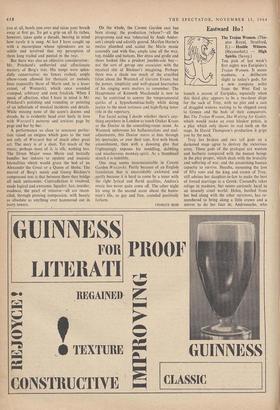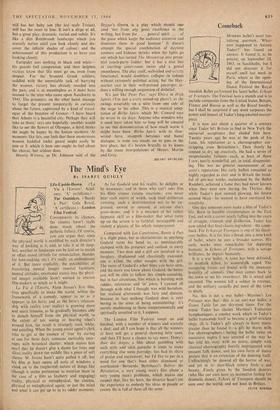Eastward Ho!
The Trojan Women. (The- atre Royal, Stratford, E.) — Hostile Witness.
o (Haymarket.) — High Tun pick of last week's first nights was Euripides's Trojan Women. It seems madness, a deliberate slight to today's gods, for a new company miles from the West End to launch a season of Euripides, especially when this third play appears to be a two-hour dirge for the sack of Troy, with no plot and a cast of draggled widows waiting to be shipped away to Greece and the beds of their conquerors. But The Trojan Women, like Waiting for Godot, which would make an even bleaker précis, is a play which only shows its real teeth on the stage. In David Thompson's production it grips you by the neck.
Troy lies broken and two tall gods on a darkened stage agree to destroy the victorious army. These gods of the prologue are wanton and barbaric compared with the human beings in the play proper, which deals with the brutality and suffering of war, and the astonishing human capacity to survive. Hecuba, mourning the loss of fifty sons and the king and crown of Troy, still advises her daughter-in-law to make the best of forced marriage to a Greek; Cassandra takes refuge in madness, but seems curiously lucid in an insanely cruel world; Helen, hustled from her bed along with the other survivors, has re- membered to bring along a little crown and a mirror to do her face in; Andromache, who still has her baby son (the last male Trojan), still has the most to lose. It isn't a dirge at all, but a great play, dramatic, varied and subtle. It's like a dim Rembrandt landscape which you scarcely notice until you look closely and dis- cover the infinite shades of colour; and the achievement of this production is to have you looking closely.
Euripides sees nothing in black and white-- his guards feel compassion, and their helpless victims know that life must go on, even from despair. For the bronzed Greek soldiers, saddled with the unenviable task of harrying the women, victory has already receded into the past, and is as meaningless as it must have seemed to the men who came upon Auschwitz in /945. The prisoners, on the other hand, manage to forget the present temporarily in curiosity about the future, captivated by a kind of travel- ogue of the beauties of Greece-11 have heard that Athens is a beautiful city. Perhaps they will take us there,' says one hopefully; another would like to see the flowers of Olympus, a third thinks she might be happy by the Ionian seashore. At moments like this, one feels that these anonymous women huddled under guard might easily be you or I; which is how one ought to feel about the chorus, but seldom does.
Hostile Witness, as Dr. Johnson said of the
Beggar's Opera, is a play which should suc- ceed 'not from any great excellence in the writing, but from the . . . general spirit ... . of the piece which keeps the audience attentive and dismisses them in good humour.' It doesn't attempt the special combination of daytime cosiness and hideous shrieks when the lights go out which has turned The Mousetrap into peren- nial coach-party fodder, but it has a nice line in startling court-room twists and a genial smoothness. The play itself, well-oiled and strictly functional, would doubtless collapse in tedium without extremely polished acting, but the Hay- market cast in their well-pressed pinstripes in- duce a willing enough suspension of disbelief.
'It's just like Peter Pan,' says Elvira in 1-Ugh Spirits ('I'm just a crazy mixed-up ghost"). as she swings miserably on a wire from one side of the stage to the other. This is a musical adap- tation of Blithe Spirit, which Mr. Coward says he wrote in six days. Anyone who wonders why it need have taken him so long will be amazed to see this demonstration of how much worse it might have been. Blithe Spirit, with its slow- witted hero, snappish heroines and banal dialogue, is none too steady on its pins in the first place, but it's beaten • brutally to its knees by the inane interpolations of Messrs. Martin and Gray.
HILARY SPURLING











































 Previous page
Previous page